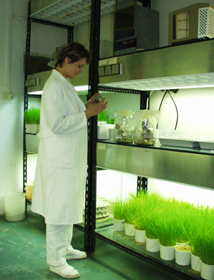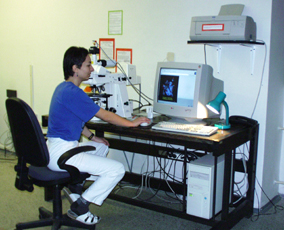 |
 |
 The Institute of Entomology is a scientific institution of basic and applied research
in areas, in which insects are either in the focus of attention (insect pests, species
useful for environment monitoring etc.) or serve as suitable models for the solution of
general biological problems.
The Institute of Entomology is a scientific institution of basic and applied research
in areas, in which insects are either in the focus of attention (insect pests, species
useful for environment monitoring etc.) or serve as suitable models for the solution of
general biological problems.
The Institute was founded on January 1, 1962, by merging
two research groups of the Czechoslovak Academy of Sciences that had existed since 1954:
Department of Pathology of the Biological Institute and a detached Laboratory of Entomology.
The Institute expanded under the leadership of Vladimír Landa and within a decade it consisted
f the Departments of Morphology, Physiology, Pathology, Toxicology, and Ecology. These units
were scattered in various locations throughout Prague until 1985 when the whole Institute
moved to a new building on the Academy campus in the town of Ceské Budejovice,
about 160 km south of Prague.
Recently, since 1.1. 2006, the Institute became a part of the Biology Centre, Academy of Sciences, CR.
The present staff of more than hundred occupies 82 assigned positions (some colleagues
and the PhD students have only part-time employment). A combination of specialists
ranging from molecular biologists to field ecologists is the major asset of the Institute.
In conjunction with the University of South Bohemia, the Institute received accreditation
for the schooling of PhD students in the fields of entomology, ecology, genetics, animal
physiology and developmental biology, and in molecular and cell biology. Extensive international
collaboration is another characteristics of the Institute; it includes work on joint research
projects, education of foreign PhD students, organisation of scientific meetings, and
publication of the European Journal of Entomology .
Since 1962, the Institute educated more than 140 PhDs and organised over 30 international
meetings. International impact of conducted research is evidenced from the rate of citations
of the works of Institute’s staff. According to the Science Citation Index, the work of each
staff member is cited about 15 times annually. A database of papers published by the Institute staff
is available interactively.
 The Institute was originally designed as an institution of applied science and has generated more than 150 patents applicable in agriculture and forestry. They concerned production of bacterial and fungal bioagents for insect pest control, introduction of pheromones for pest signalling, use of parasitoids and predators in the aphid control, development and applications of the analogues of insect juvenile hormone, and others. Discovery of the immunosuppressive cyclosporine was a very important side-product of the research on entomopathogenic fungi. Other practical contributions of the Institute were made in the area of nature conservation and environment protection. Monitoring of insects in Czechoslovak rivers, which has been going on for nearly fifty years, provides crucial background for the present attempts to clean up the waters. Long-term records of insects occurring in several wetlands are important for the assessment of climatic changes and for landscape management.
The Institute was originally designed as an institution of applied science and has generated more than 150 patents applicable in agriculture and forestry. They concerned production of bacterial and fungal bioagents for insect pest control, introduction of pheromones for pest signalling, use of parasitoids and predators in the aphid control, development and applications of the analogues of insect juvenile hormone, and others. Discovery of the immunosuppressive cyclosporine was a very important side-product of the research on entomopathogenic fungi. Other practical contributions of the Institute were made in the area of nature conservation and environment protection. Monitoring of insects in Czechoslovak rivers, which has been going on for nearly fifty years, provides crucial background for the present attempts to clean up the waters. Long-term records of insects occurring in several wetlands are important for the assessment of climatic changes and for landscape management.
 Most of the current investigations, which are supported by more than 30 domestic and foreign grants, focus on the solution of general theoretical problems. The scope of current work is evident from the presentations of individual Departments:
Most of the current investigations, which are supported by more than 30 domestic and foreign grants, focus on the solution of general theoretical problems. The scope of current work is evident from the presentations of individual Departments:
 Wetland Ecology Wetland Ecology
 Theoretical Ecology Theoretical Ecology
 Developmental Biology Developmental Biology
 Ecology and Conservation Biology Ecology and Conservation Biology
 Experimental Ecology Experimental Ecology
 Genetics Genetics
 Analytical Biochemistry Analytical Biochemistry
 Physiology Physiology
 Ecophysiology Ecophysiology
|
 |
 The Institute of Entomology is a scientific institution of basic and applied research
in areas, in which insects are either in the focus of attention (insect pests, species
useful for environment monitoring etc.) or serve as suitable models for the solution of
general biological problems.
The Institute of Entomology is a scientific institution of basic and applied research
in areas, in which insects are either in the focus of attention (insect pests, species
useful for environment monitoring etc.) or serve as suitable models for the solution of
general biological problems.  The Institute was originally designed as an institution of applied science and has generated more than 150 patents applicable in agriculture and forestry. They concerned production of bacterial and fungal bioagents for insect pest control, introduction of pheromones for pest signalling, use of parasitoids and predators in the aphid control, development and applications of the analogues of insect juvenile hormone, and others. Discovery of the immunosuppressive cyclosporine was a very important side-product of the research on entomopathogenic fungi. Other practical contributions of the Institute were made in the area of nature conservation and environment protection. Monitoring of insects in Czechoslovak rivers, which has been going on for nearly fifty years, provides crucial background for the present attempts to clean up the waters. Long-term records of insects occurring in several wetlands are important for the assessment of climatic changes and for landscape management.
The Institute was originally designed as an institution of applied science and has generated more than 150 patents applicable in agriculture and forestry. They concerned production of bacterial and fungal bioagents for insect pest control, introduction of pheromones for pest signalling, use of parasitoids and predators in the aphid control, development and applications of the analogues of insect juvenile hormone, and others. Discovery of the immunosuppressive cyclosporine was a very important side-product of the research on entomopathogenic fungi. Other practical contributions of the Institute were made in the area of nature conservation and environment protection. Monitoring of insects in Czechoslovak rivers, which has been going on for nearly fifty years, provides crucial background for the present attempts to clean up the waters. Long-term records of insects occurring in several wetlands are important for the assessment of climatic changes and for landscape management.
 Most of the current investigations, which are supported by more than 30 domestic and foreign grants, focus on the solution of general theoretical problems. The scope of current work is evident from the presentations of individual Departments:
Most of the current investigations, which are supported by more than 30 domestic and foreign grants, focus on the solution of general theoretical problems. The scope of current work is evident from the presentations of individual Departments: